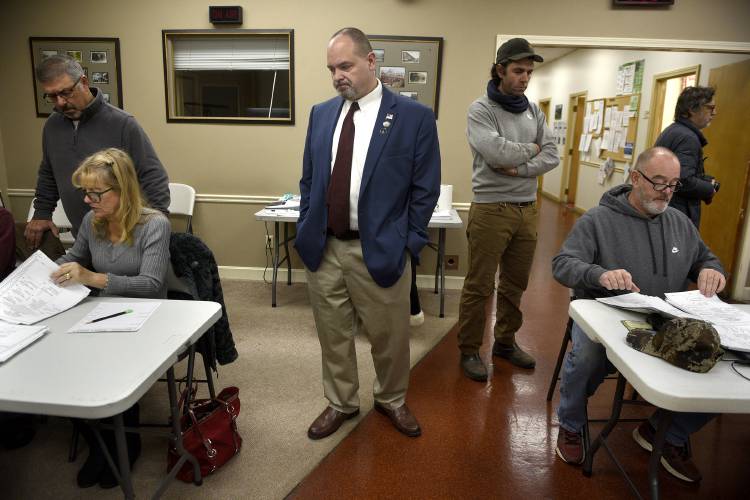Court denies ex-officer’s attempt to block records’ release

Standing between two tables, Claremont City Councilor Jonathan Stone, left, watches votes being counted with incoming city councilor Jonathan Hayden at City Hall in Claremont, N.H. on Tuesday, Nov. 14, 2023. Hayden defeated Stone last week for the Ward III seat 247-241. Stone asked for a recount of the results, which did not change. Assistant Mayor Debbie Matteau and Ward III Moderator Bill Blewitt, right, count votes as Keith Raymond observes.(Valley News - Jennifer Hauck) Copyright Valley News. May not be reprinted or used online without permission. Send requests to permission@vnews.com. Valley News – Jennifer Hauck
| Published: 03-20-2024 8:31 PM |
CONCORD — In a decision that could ripple across the law enforcement community around the state, the New Hampshire Supreme Court has ruled that a former Claremont officer and current state legislator’s disciplinary records relating to his time as a police officer for the city can be released to the public.
The state’s high court affirmed on Wednesday a lower court’s decision that the internal affairs reports of Jonathan Stone, who was a Claremont cop for six years in the early 2000s and currently represents a House district made up of Claremont and eight other towns in the New Hampshire Legislature, are not exempt from public disclosure that he has long sought to block.
“We conclude that the 2007 Stipulated Award does not protect the requested records at issue on appeal from disclosure,” five high court justices concurred in an eight-page decision after hearing oral arguments in November. “We also conclude that the plaintiff waived any argument that the requested records are exempt from disclosure.”
Wednesday’s decision was hailed as a victory by advocates of public right-to-know laws but simultaneously criticized by the state’s law enforcement community, who contend the ruling will lead to sullying reputations of police officers by publicly airing unfounded allegations of wrongdoing.
“Today’s decision is a victory for transparency in which the court makes clear that an agreement between a city and former public official did not allow them to circumvent government transparency and our Right-to-Know Law,” Gilles Bissonnette, legal director at the American Civil Liberties Union of New Hampshire, said on Wednesday afternoon.
Stone’s attorney, Peter Decato, said on Wednesday that while he and his client respect the court’s decision, he nonetheless foresees unintended consequences affecting municipalities’ ability to negotiate contracts with public employee unions to unsubstantiated allegations unfairly tarring a person’s reputation.
“I predict this decision will have an impact on collective bargaining (and) will unnecessarily expose people for their unproved allegations and will unreasonably indict Jonathan,” Decato said. “So is this really in the public interest?”
At issue are records — including reprimands — that Stone argued were confidential under the terms of his resignation from the Claremont police department in 2007.
Article continues after...
Yesterday's Most Read Articles
Stone, a Republican and former member of the Claremont City Council, was a controversial figure who narrowly lost re-election in 2023. Following other court defeats, he maintained that during his arbitration proceeding with the city there was never any finding of wrongdoing.
“Seventeen years ago, the City of Claremont and Jonathan Stone agreed to turn back the clock,” Decato said in an email. “By doing so, they agreed to disagree whether Jonathan had violated personnel rules and regulations and whether Jonathan had acted inappropriately. Jonathan was allowed to resign from the force. He was not terminated. The city and Mr. Stone acted lawfully in 2007 when they entered into this agreement. Now, seventeen years later, unproven and disputed facts will be exposed to the community.”
Stone’s legal battle to keep his police file private began in 2020 after freelance journalist Damien Fisher asked Claremont officials for Stone’s disciplinary records under the state’s right-to-know law. Fisher’s request itself followed on the heels of two state Supreme Court decisions that made it possible for internal records pertaining to alleged police misconduct to become public information.
Stone sued in Sullivan County Superior Court to block the city from releasing the records, arguing the city was violating the terms of his separation agreement and failing to protect his “privacy interests.” Two powerful entities — the ACLU of New Hampshire and the Union Leader newspaper — joined the fight, contending that the public interest outweighed Stone’s privacy concerns.
In 2022, Sullivan County Superior Court Judge Martin Honigberg, citing an analysis of prior case law, ruled that the gravity of misconduct recorded in Stone’s police disciplinary records elevated the public interest above Stone’s privacy concerns. He denied Stone’s request for an injunction.
Stone, through veteran Lebanon trial attorney Decato, appealed the Superior Court’s decision to the state Supreme Court.
In its own analysis, the Supreme Court said that a “plain reading” of the separation agreement between Stone and the city in fact showed that two pillar provisions Stone cited in his effort to block release of his police disciplinary records — confidentiality and “purging” of information — was “qualified” in the former and pertained in the latter only to purging information in his “personnel file” and did not call for “wholesale destruction of the records in question.”
Associate Justice Anna Barbara Hantz Marconi appended a nuanced concurrence, saying that while she agreed in the outcome she was worried the court was on a slippery slope.
“I am concerned that the majority’s opinion takes an incremental step, under the facts of this case, to preclude the use of confidential settlements by governmental entities,” Hantz Marconi wrote. “Such agreements can serve an important purpose and our developing (the applicable statute) along with other record retention policies, may reduce or eliminate the availability of this device.”
She warned that the court’s “interpretation of exemptions” in earlier cases — cited in the majority concurrence — has already “impacted the treatment of law enforcement records in various ways.”
That warning wasn’t lost on Stone’s attorney, Decato, who noted that the associate justices’ qualified concurrence “got it right.”
The ACLU of New Hampshire’s Bissonnette said that although it “remains to be seen” how Wednesday’s Supreme Court decision might play out across other municipalities and police departments around the state, he nonetheless hopes that “in the future (they) don’t engage in these types of agreements, which are designed to restrict public access. We don’t believe that confidentiality agreements can legally impede the public from getting access to disciplinary records.”
Contact John Lippman at jlippman@vnews.com.

 At Dartmouth, hundreds protest ongoing war in Gaza and express support for academic freedom
At Dartmouth, hundreds protest ongoing war in Gaza and express support for academic freedom Over Easy: ‘A breakfast without a newspaper is a horse without a saddle’
Over Easy: ‘A breakfast without a newspaper is a horse without a saddle’
